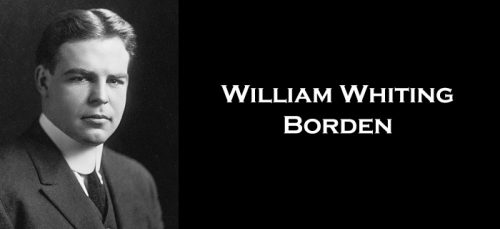William Whiting Borden

By Megan McKinney

William Whiting Borden.
The fourth of William and Mary Borden’s extraordinary children was William. Following his graduation from The Hill School at 16 in 1904, Bill’s parents felt he should spend a chaperoned year traveling around the world before entering college. Twelve months of observing people far from the corner of Bellevue Place and Lake Shore Drive shaped the remainder of Bill Borden’s life.
While traveling through Europe, Asia and the Middle East, he became increasingly touched by the world’s misery and wrote home, “I’m going to give my life to prepare for the mission field.”
Actually, there was a background for this seemingly abrupt decision; when Bill was seven, his mother “experienced Christ in a radical way” and converted to evangelical Christianity. She began taking the little boy with her to the Moody Church. He had quickly responded with enthusiasm equal to hers and soon they were praying together at the start of each day.
After entering Yale, Bill continued a version of this ritual by praying before breakfast with one other student. Soon another student joined them, and then a third. At the end of the school year, 150 freshmen were meeting with Bill for weekly Bible studies, and, by his senior year, 1,000 of Yale’s 1,300 students had joined them!
Young Borden has been described as gifted with a “charismatic personality . . . sociable, athletic, and fun loving.” But he was also “an intense and hardworking natural leader. At Yale, he was elected president of Phi Beta Kappa and was active in several collegiate sports, especially wrestling and crew. He also became the master of his own sailing yacht.” Fearing that joining a fraternity might “set him apart from the body of the class,” he did not.

Bill applied his religion by attending to New Haven’s widows, orphans, alcoholics and others in need. Soon his devotion to God’s business attracted the attention of the Reverend John Gillespie Magee, who suggested they found a rescue mission, patterned on the Pacific Garden Mission in Chicago and New York’s Water Street Mission, to aid New Haven’s unemployed dockworkers, prisoners recently released from the county jail and others in need. This would also provide a way for privileged Yale undergraduates to learn about others whose lives were so different from their own.
 Yale Hope Mission.
Yale Hope Mission.
Together Bill and Reverend Magee founded the Yale Hope Mission; the result of their efforts had such impact that a visiting Englishman—a sophisticated world traveler—when asked what had most impressed him about America, replied, “The sight of that young millionaire kneeling with his arm around a ‘bum’ in the Yale Hope Mission.”
 The Reverend John G. Magee.
The Reverend John G. Magee.
The Reverend Magee, an American Episcopal priest and former missionary in Nanking, China, was quite a figure in his own right. He is credited with saving the lives of hundreds of thousands of Chinese soldiers and civilians who were faced with being butchered by the Japanese during the December 1937–January 1938 Nanking Massacre. Throughout much of the barbarism, he was able to capture the wholesale slaughter on film, which proved invaluable in documenting the atrocity.
In addition, Reverend Magee was father of poet John Gillespie Magee Jr., who had joined the Royal Canadian Air Force in 1940, and would become known as the Rupert Brooke of World War II, while also providing a mirror to William Whiting Borden. The younger Magee’s sonnet “High Flight” was composed following an August 18, 1941 aeronautical expedition/religious experience. Almost immediately after landing his plane, he wrote the following:
Oh, I have slipped the surly bonds of earth,
And danced the skies on laughter-silvered wings;
Sunward I’ve climbed, and joined the tumbling mirth
Of sun-split clouds—and done a hundred things
You have not dreamed of—wheeled and soared and swung
High in the sunlit silence. Hov’ring there
I’ve chased the shouting wind along, and flung
My eager craft through footless halls of air…
Up, up the long, delirious, burning blue
I’ve topped the windswept heights with easy grace
Where never lark, or even eagle flew.
And, while with silent, lifting mind I’ve trod
The high untrespassed sanctity of space
Put out my hand, and touched the face of God.
A few months later, again in the “high untrespassed sanctity of space,” the 19-year-old perished in a mid-air collision over Lincolnshire. The immediate popularity of “High Flight” and the poetic nature of the tragedy following it gained legendary status for John G. Magee Jr., which has continued to this day.
Bill Borden—following his 1909 graduation from Yale—entered Princeton Theological Seminary, where his unique impact was as powerful as it had been in New Haven. A Princeton professor, Charles R. Erdman, wrote that no other student had exerted a greater personal influence over him than Borden. “His judgement was so unerring and so mature that I always forgot there was such a difference in our ages. His complete consecration and devotion to Christ were a revelation to me, and his confidence in prayer a continual inspiration.”
On completion of his Princeton studies in 1912, the reputation of this 22-year-old was such that he was made a board member of the National Bible Institute in New York City and, for a time, was in command of the entire ministry—office management, oversight of student practical training and operation of four rescue missions. In addition, he became a director of Moody Bible Institute and a member of the North American Council of the China Inland Mission.
Following his ordination, which took place at The Moody Church, young Borden’s missionary calling was focused on converting Muslim Kansu people in northwestern China. The plan was for him—on his way to China—to stop in Egypt to study Arabic. In Cairo, he would live with members of a Syrian family to absorb their language and customs. When Borden sailed for Cairo, the Chicago papers carried headlines such as “Millionaire Gives Up All.”

However, in March 1913, while living with the Syrian family in Cairo, he contracted spinal meningitis, and, within a month, the saintly 25-year-old Bill Borden was dead.
He was buried in the American Cemetery in Cairo, where the words, “Apart from faith in Christ, there is no explanation of such a life,” are inscribed on his tomb—words suggested by Professor Erdman, whom Bill so influenced while at Princeton Theological Seminary.
 “Apart from faith in Christ, there is no explanation of such a life.”
“Apart from faith in Christ, there is no explanation of such a life.”
His mother, who had traveled to Egypt to vacation with Bill, was present at his funeral. In Princeton, memorial services were conducted at the University, as well as at a little African Methodist church where he had taught Sunday school for two years. Other rites were held at Yale Hope Mission, at Moody Church, at Marble Collegiate Church in New York, and in Japan, Korea, India and South Africa.

When the news of William Whiting Borden’s death was cabled back to the United States, the story was carried by nearly every American newspaper. “A wave of sorrow went round the world . . . Borden not only gave (away) his wealth, but himself, in a way so joyous and natural that it (seemed) a privilege rather than a sacrifice,” wrote Mary Taylor in the introduction to her biography, Borden of Yale.

Always surrounding the legend of William Whiting Borden are the words No Reserve. No Retreat. No Regrets. From one source, comes the following explanation.
“According to an off-repeated anecdote, following Borden’s death, his mother found in his Bible the words ‘No Reserve’ and a date suggesting it had been written shortly after he had renounced his fortune in favor of missions. Later, he was said to have written ‘No Retreat,’ after his father supposedly told him that he would never hold a position in the family business. Finally, shortly before he died in Egypt, he is supposed to have added the phrase ‘No Regrets.’ There is no evidence for the historicity of this anecdote. If Borden ever wrote those words in a Bible, the Bible has not been discovered.”

Megan McKinney’s Classic Chicago series on The Bordens will continue next week with The (Nearly) Presidential Bordens.
Author Photo:
Robert F. Carl








